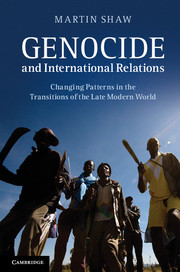Book contents
- Frontmatter
- Dedication
- Contents
- Acknowledgements
- Introduction
- Part I Perspectives
- Part II Twentieth-century genocide
- 4 European genocide: inter-imperial crisis and world war
- 5 The 1948 Convention and the transition in genocide
- 6 Cold War, decolonization and post-colonial genocide
- 7 The end of the Cold War and genocide
- Part III New patterns of genocide
- Bibliography
- Index
5 - The 1948 Convention and the transition in genocide
Published online by Cambridge University Press: 05 June 2014
- Frontmatter
- Dedication
- Contents
- Acknowledgements
- Introduction
- Part I Perspectives
- Part II Twentieth-century genocide
- 4 European genocide: inter-imperial crisis and world war
- 5 The 1948 Convention and the transition in genocide
- 6 Cold War, decolonization and post-colonial genocide
- 7 The end of the Cold War and genocide
- Part III New patterns of genocide
- Bibliography
- Index
Summary
Twentieth-century European genocide developed within an inter-imperial international system that had already produced colonial genocide. However the latter happened episodically across several continents over five centuries, out of repeated but often discrete clashes of Western European empires with indigenous polities and societies, conditioned by inter-imperial rivalry but not a direct outcome of it. In contrast the high-genocidal period in Europe was packed into roughly three-quarters of a century, from the 1870s to 1949, concentrated chiefly in the eastern parts of the continent, and came to a head during the two pan-European wars resulting directly from the rivalries of the major empires. As we have seen, the Second World War generalized genocide in parts of Europe and Asia.
In this chapter I explore how genocide changed again with the ending of that war, which produced the most radical changes in world politics of modern times. I argue that incidence and forms of genocide changed as the international system changed in the ‘post-war’ era. The imperial system changed in two crucial directions. First, complex multi-imperial rivalries were replaced by the competition of two Cold War blocs, which after the Sino-Soviet split became three-way rivalry between the West, the Soviet bloc and China. Second, European colonial empires were replaced by a large number of independent post-colonial states. And if the new world international context changed the patterns of genocide, particular interest lies in the ‘transition’ period at the end of the war – not least because this was when the new United Nations Organization drafted and adopted the Convention on the Prevention and Punishment of the Crime of Genocide. In this chapter I locate these key years in the history of genocide, and develop a more general discussion of the changes in the international system and how they impacted on it. In Chapter 6, following, I outline a longer survey of genocide in the era of Cold War, decolonization and the consolidation of post-colonial states.
- Type
- Chapter
- Information
- Genocide and International RelationsChanging Patterns in the Transitions of the Late Modern World, pp. 86 - 97Publisher: Cambridge University PressPrint publication year: 2013



